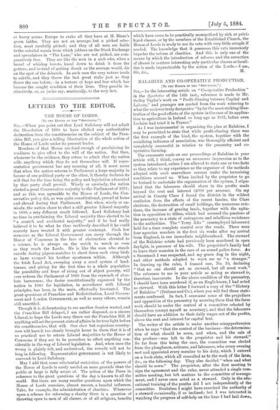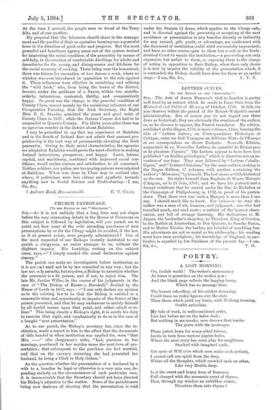RALAHINE AND CO-OPERATIVE PRODUCTION.
[To THE EDITOR OF THE "SPECTATOR.'] SIR,—In the interesting article on " Co-operative Production" in the Spectator of the 14th inst., reference is made to Mr. Sedley Taylor's work on " Profit-Sharing between Capital and Labour," and passages are quoted from the work referring to what the reviewer truly designates "by far the most striking illus- tration of the good effects of the system in the case of its applica- tion to agriculture in Ireland so long ago as 1831, before even Leclaire had tried it in France."
As I was instrumental in organising the plan at Ralahine, I may be permitted to state that while profit-sharing there was the first example of the kind, the system, together with the socialising influence of association, was thoroughly efficient and completely successful in relation to the peasantry and co- operative farming.
The comments made on our proceedings at Ralahine in your
article will, I think, convey an erroneous impression as to the system introduced, unless I am allowed to state one or two facts as they i-elate to my experience as the organiser of the methods adopted with such marvellous success under the terrorising conditions around us. When invited by the proprietor to go to Ireland to undertake the organisation of the system, I stipu- lated that the labourers should share in the profits made beyond the rent and interest (2900 per annum). On my arrival in County Clare I found the district in the wildest confusion from the effects of the recent famine, the Clare elections, the destruction of small holdings, the numerous evic- tions, the increase of grazing lands, together with the agita- tion in opposition to tithes, which had aroused the passions of the peasantry to a state of outrageous and rebellious resistance to the authorities. The " Terry Alts " (unemployed labourers) held for a time complete control over the roads. There were four agrarian murders in the first six weeks after my arrival from England, in our immediate neighbourhood. The steward of the Ralahine estate had previously been murdered in open daylight, in presence of his wife. The proprietor's family had to leave their mansion in the care of an armed police force. As a Sassenach I was suspected, and my grave dug in the night, and other methods adopted to warn me as " a stranger." In drawing np the rules, I framed one, No. 10, declaring " that no one should act as steward, but all must work." The reference to me in your article as acting as steward is, therefore, inaccurate. In the above condition of the peasantry, I should have been murdered if, as an Englishman, 1 had acted as steward. With this letter I forward a copy of the "History of Ralahine " (Triibner and Co.), where you will find these state- ments confirmed. In fact, I overcame some of the prejudices and opposition of the peasantry by assuring them that the farm work should be under the control of a committee selected by themselves (except myself as secretary), and that the labourers should have an addition to their daily wages out of the profits, above the rent and interest for capital lent.
The writer of the article is under another misapprehension
when he says "that the control of the business—the determina- tion of what should be sown, and when, and the sale of the produce—was left to the proprietor and his steward." So far from this being the case, the committee was elected from the ploughmen, artisans, and labourers, who every evening met and appointed every member to his duty, which I entered on a book-slate, which all consulted as to the work of the farm, &-c., on the following day. They also decided " when and what should be sown." The proprietor, after the first meeting to sign the agreement and the rules, never attended a single com- mittee meeting, but left matters to the committee of manage- ment, and I never once acted as a steward. Only in the edu- cational training of the youths did I act independently of the committee. Doubtless I might have exercised the authority of a steward occasionally, if so inclined; but I was interested in watching the progress of self-help on the lines I had laid down.
At the time I arrived, the people were in dread of the Terry Alts, and of one another.
My proposal that the labourers should share in the manage- ment and the profits of their co-operative farming was a powerful lever in the direction of good order and progress. But the most powerful and beneficent agency arose out of the system devised for improving the social condition of the peasantry by means of self-help, in the erection of comfortable dwellings for adults and dormitories for the young, and dining-rooms and kitchens for the social economy of cooking. These being near the homestead, there was leisure for recreation at two dances a week, where no whiskey was ever introduced in opposition to the rule against it. These influences were effective in socialising and refining the "wild Irish," who, from being the terror of the district, became, under the guidance of a Saxon, within two months, orderly, industrious, contented, thrifty, and comparatively happy. So great was the change in the peaceful condition of County Clare, caused mainly by the socialising influence of our Co-operative Farming, that the Irish Secretary, the Right Hon. E. G. Stanley, admitted the peace and good order of County Clare in 1833 ; while the Habeas Corpus Act had to be suspended in Queen's County. For thirty years after there was no agrarian murder in the district about Ralahine.
I may be permitted to say that my experience at Ralahine and in the South of Ireland does not admit that peasant pro- prietorship is the best way of permanently elevating the Irish peasantry. Owing to their racial characteristics, the agencies we adopted at Ralahine would prove the most effective in making Ireland industrious, prosperous, and happy. Land, labour, capital, and machinery, combined with improved social con- ditions, would realise success and satisfaction to all concerned. Neither soldiers, nor police, nor tax-paying poisons were required at Ralabine. What was done in Clare may be realised else- where, if politicians were less obtuse and apathetic towards anything new in Social Science and Profit-sharing.—I am, Sir, &c., 3 Andover Road, Hammetsmit11. E. T. CRAIG.











































 Previous page
Previous page